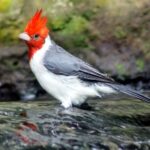Living with a screaming bird can be stressful for any pet owner. Screaming in birds is a form of communication and can signal various needs or issues. Whether your bird is calling for attention, feeling stressed, or expressing discomfort, understanding these signals is the first step to addressing the behavior.
The first thing to recognize is that birds scream for a reason. It could be a response to boredom, a lack of stimulation, or even a need for social interaction. Providing your bird with toys, engaging in interactive play, and maintaining a consistent routine can greatly reduce the frequency of these outbursts.
In some cases, a bird’s screaming may point to a deeper issue such as illness or environmental stress. Ensuring your bird gets enough sleep and consulting with an avian veterinarian if the screaming persists can be essential steps in managing and improving your bird’s well-being.
Key Takeaways
- Birds scream to communicate needs or issues.
- Addressing boredom and providing stimulation can reduce screaming.
- Persistent screaming may require consultation with an avian vet.
Understanding and Addressing Screaming in Birds
Pet birds, including parrots and cockatiels, often scream due to boredom, loneliness, or fear. Addressing excessive screaming involves understanding its causes, creating a supportive environment, employing training strategies, and seeking professional help when necessary.
Identifying the Causes of Screaming
Birds scream for many reasons. Common triggers include boredom, loneliness, and fear. Species-specific behaviors also play a role. For instance, parrots use vocalizations to communicate or signal distress. Identifying these triggers helps in addressing the root cause. Watch your bird’s body language and behavior closely. Stress or health issues, hunger, and lack of social interaction can also lead to excessive screaming. Consulting an avian vet can rule out illness.
Creating a Supportive Environment
A bird’s environment influences its behavior. Providing enrichment and mental stimulation, like toys and puzzles, can keep your bird from getting bored. Create a calm environment with a routine that includes periods of social interaction. Avoid sudden changes and loud noises that can scare your bird. A comfortable and safe perch is also important. Consistent environmental enrichment makes a big difference. Ensure they have a balanced diet to reduce screaming caused by nutritional deficiencies.
Behavioral and Training Strategies
Training can reduce excessive screaming. Use positive reinforcement by rewarding quiet behavior with treats. Gradually desensitize your bird to situations that cause anxiety, like being left alone. Introduce toys or activities that distract and engage them. Avoid yelling back as it can worsen the behavior. Consistency is key in training. Implementing a time-out strategy, where the bird is briefly isolated upon screaming, can help. Teach acceptable behaviors in a calm and consistent manner.
When to Seek Professional Help
Sometimes, a bird’s screaming may need professional intervention. If basic strategies do not work or if the bird exhibits signs of distress or aggression, consulting an avian behaviorist or avian veterinarian is essential. Persistent screaming despite efforts to engage and comfort your bird might indicate deeper health or psychological issues. Professional help ensures your bird receives comprehensive care and tailored solutions to behavior problems. They help address complex causes and create a personalized plan.
Frequently Asked Questions
Addressing a bird’s screaming involves understanding its needs and providing proper care. Effective techniques and remedies can help alleviate the issue and ensure the bird stays content and healthy.
How can I reduce my bird’s screaming at night?
To reduce night-time screaming, ensure the bird has a consistent sleep schedule. Cover the cage with a dark cloth to mimic night and block out any light. Reduce noise in the surrounding area.
What can cause a bird to scream incessantly, and how can it be addressed?
Birds may scream due to boredom, stress, or seeking attention. Providing toys and social interaction can help. Adjusting the bird’s environment to reduce stressors may also be beneficial.
What are effective strategies for preventing a bird from screaming early in the morning?
Try feeding your bird in the evening to ensure it’s not hungry. Keep the cage covered to block early morning light. Provide toys or items that can engage the bird’s attention when it wakes up.
How do you manage a bird that screams excessively when left alone in a room?
Gradually acclimate the bird to being alone by leaving it for short periods and gradually increasing the time. Provide interactive toys and a radio with soft music to keep the bird occupied.
What does persistent screaming in a bird indicate about its well-being or environment?
Persistent screaming might indicate that the bird is unwell or unhappy. It could mean a lack of social interaction, a health issue, or an uncomfortable environment. Consult a veterinarian if the behavior persists.
What techniques are recommended for soothing a loud or agitated bird?
Speak softly and calmly to the bird. Offer a favorite toy or treat to distract it. Sometimes, simply staying close can help the bird feel more secure. Avoid yelling or reacting negatively, as this can increase the bird’s stress.






